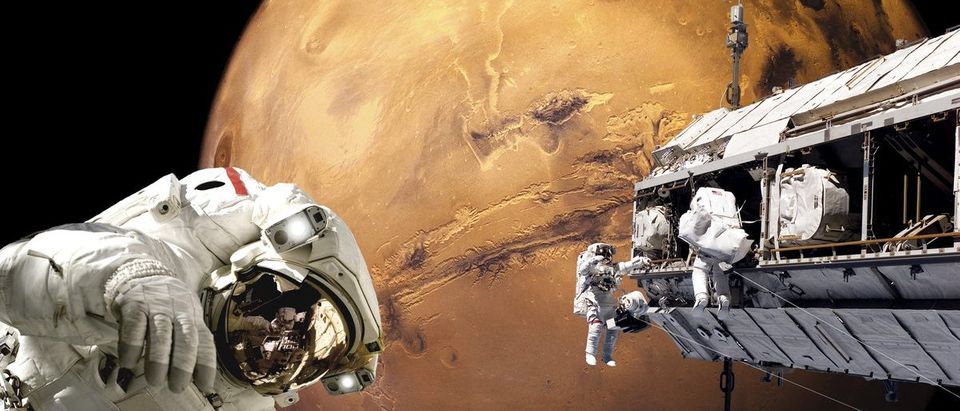SpaceX’s billionaire founder Elon Musk answered questions on Reddit Monday about his plans to send a manned spacecraft to Mars and colonize the Red Planet within a decade.
Musk plans to start by shipping equipment to Mars to build a plant that will create rocket fuel for return trips to Earth. SpaceX is apparently already working on equipment for the project.
“We are still far from figuring this out in detail, but the current plan is,” Musk told Reddit. “1: send Dragon [SpaceX’s capsule] scouting missions, initially just to make sure we know how to land without adding a crater and then to figure out the best way to get water for the CH4/O2 Sabatier Reaction. 2: Heart of Gold spaceship flies to Mars loaded only with equipment to build the propellant plant.”
Musk noted that his first manned crew would construct a propellant plant, which would be followed up by sending additional personnel and colonists on a mission to Mars when the alignment of the planets allows it every 26 months.
Musk says he plans to drastically cut the expected $10 billion per person cost to get to Mars. He didn’t specify how he’d do it, only noting that fully reusable rockets, orbital refueling and production of rocket fuel on Mars would be involved. Musk plans to send the first missions to Mars in 2018 or 2020.
The billionaire stated the Interplanetary Transport System (ITS) rocket that will take astronauts to Mars will originally only be capable of sending about 10 people to Mars to establish a colony. Musk hopes to eventually build 1,000 ships that will allow the initial outpost to grow into something much larger and become self-sustaining, housing at least one million people. It would only take 40 to 100 years to achieve a self-sustaining civilization on Mars. Animations shown by SpaceX suggest that the company plans to start terraforming Mars, making it more Earth-like.
Musk’s presentation noted that the ITS would be about 400-feet tall, potentially making it the largest rocket in history. He repeatedly depicted the rocket as larger and more powerful than the Saturn V rocket which NASA sent to Earth’s moon. ITS would be capable of sending 450 tons of cargo to Mars.
A SpaceX rocket recently exploded in early September, likely costing his cash-strapped company $120 million.
Blue Origin, a private space company set up by Amazon.com founder Jeff Bezos, successfully launched and recovered the first reusable rocket last November. The company unveiled plans early last month for a slightly smaller rocket than Space X. These comapnies are in a race to develop the fully reusable rockets necessary to make Mars missions economical.
SpaceX previously failed on two separate occasions to successfully land a reusable rocket. Musk called the failure a “huge blow.” SpaceX’s President Gwynne Shotwell previously estimated reusing rockets could cause a 30 percent reduction in launch costs, meaning that Musk’s plans aren’t even close to meeting his goals.
SpaceX has had several rockets explode during landing attempts. It took nearly six months before Falcon 9 launches were resumed after SpaceX’s last launch failure. Musk’s business rivals have estimated that it could take up to a full year for SpaceX to resume launches. The company says it plans to return to space in November.
Blue Origin’s two-stage New Glenn rocket will be 270 feet tall and 23 feet in diameter and capable of generating 3.85 million pounds of thrust. This is much larger than Musk’s planned 230-foot-tall Falcon Heavy rocket.
Bezos’s rocket will also be much larger than NASA’s planned 212-foot-tall Space Launch System rocket, which will only by capable of generating 3.6 million pounds of thrust. New Glenn’s engines will burn liquefied natural gas and oxygen. Blue Origin’s very first orbital rocket will have slightly more than half the thrust of the Saturn V rockets that carried humans to the moon.
When announcing the capabilities of his new rocket, Bezos took every opportunity to highlight that his company spends zero tax dollars, while SpaceX benefits from lucrative financial arrangements with NASA.
Send tips to andrew@
All content created by the Daily Caller News Foundation, an independent and nonpartisan newswire service, is available without charge to any legitimate news publisher that can provide a large audience. All republished articles must include our logo, our reporter’s byline and their DCNF affiliation. For any questions about our guidelines or partnering with us, please contact licensing@dailycallernewsfoundation.org.


